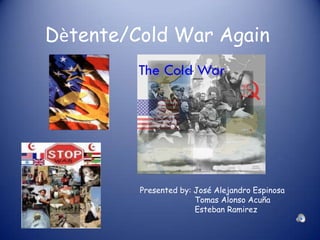
Cold war sociales
- 1. Dètente/Cold War Again Presented by: José Alejandro Espinosa Tomas Alonso Acuña Esteban Ramirez
- 2. The relations During the Cold War (1947-1991) there weren't direct attacks between the United States and the Soviet Union, but the tensions between them were very uncomfortable. Also this really bad relations with U.S include countries like Cuba or China that were communist like the Soviet Union. But there were some actions and attitudes of the governments, in some times that try to comfort those relations.
- 3. Dètente (Causes) (1970) One of these actions was named as détente in the 70`s. The NATO powers and the Warsaw Pact both had pressing reasons to seek relaxation in tensions. Leonid Brezhnev and the rest of the Soviet leadership felt that the economic burden of the nuclear arms race was unsustainable. The Cuban Missile Crisis showed how dangerous the relations between the USSR and the USA were becoming. John F. Kennedy and Nikita Khrushchev wished to reduce the risk of a nuclear war, as they were aware that the nuclear arsenals on each side granted mutually assured destruction. In English let down or release.
- 4. Treaties of peace Before the détente, there were a couple of treaties that release the tension, the Nuclear Non-Proliferation Treaty and Outer Space Treaty. The most important pact of this time, were in the Nixon's government because he was the one who developed those ideas of peace. Nixon intensify the idea of the non-nuclear activity by creating the SALT (Strategic Arms Limitation Talks). SALT II was also crated by the governments of U.S and the Soviet Union to prevent the creation of missiles in large quantity.
- 5. Good consequences after the treaties With these “alliance” between these two countries, the space mission increase and with the cooperation they got more knowledge. The European countries, follow this actions of the big countries and also made his treaties that promote the peace and the non-nuclear activity. The economy of both countries, increase in those years
- 6. PERSISTENT CONFLICTS Persistent conflicts
- 7. Persistent conflicts Although friendship and good relations were increasing, competitiveness remain in both of the super-power nations, specially in the third world. Wars in South Asia in 1971 and also in the Middle East in 1973 caused a huge material and diplomatic support from the countries to their allies. In Latin America, the United States continued blocking any kind of left or communist movements with right-military coups. During the period of détente, Vietnam war still developing. Any of the sides trusted fully in the other and the potential for nuclear war remained.
- 8. Submaries, aircraft and missiles persisted
- 9. Europe Korea
- 10. Détente Ends
- 11. Détente Ends The soviet invasion of AfghanistanThe Soviet invasion of Afghanistan that was to shore up a struggling allied regime led to harsh criticisms in the west and a boycott of the 1980 Summer Olympics, which were to be held in Moscow. Jimmy Carter boosted the U.S. defense budget and began financially aiding the President of Pakistan, General Muhammad Zia-l-Haq, who would in turn subsidize the anti-Soviet Mujahideen fighters in the region. The 1980 American presidential election saw Ronald Reagan elected on a platform opposed to the concessions of détente. Negotiations on SALT II were abandoned.
- 12. COLD WAR AGAIN
- 13. DETENTE
- 14. Bibliography www.historylearningsite.co.uk/detente.htm www.u-s-history.com/pages/h1946.htm www.thefreedictionary.com/detente www.wikipedia.com